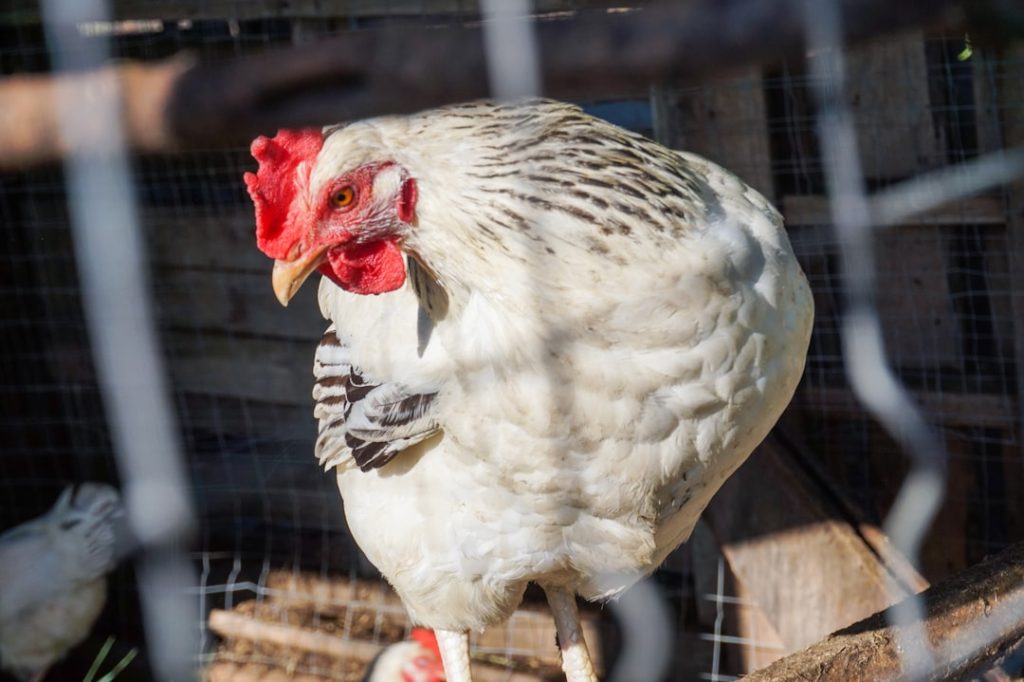Chickens are social creatures that thrive in structured environments. They possess a natural instinct to scratch and peck at the ground, which can lead them to wander into undesirable areas like sidewalks. Understanding their behavior is essential for creating appropriate roaming areas and preventing unwanted exploration.
These birds have an innate tendency to roost at night, making it crucial to provide adequate roosting and nesting spaces. This ensures their comfort and reduces the likelihood of them seeking alternative roosting spots, such as sidewalks. Chickens are creatures of habit and can be trained to use specific areas for elimination through patience and consistency.
Their intelligence allows them to learn and follow rules and routines. However, if behavioral issues persist, seeking professional assistance may be necessary to address problems causing chickens to wander onto sidewalks. As curious and social animals, chickens require mental stimulation and physical activity for optimal well-being.
By comprehending their behavior and providing a suitable environment, it is possible to keep chickens away from sidewalks while ensuring their happiness and health.
Table of Contents
- 1 Creating a Designated Chicken Area
- 2 Providing Adequate Roosting and Nesting Spaces
- 3 Using Deterrents to Keep Chickens Away from Sidewalks
- 4 Regularly Cleaning and Maintaining the Chicken Area
- 5 Training Chickens to Use a Specific Area for Elimination
- 6 Seeking Professional Help if Necessary
- 7 FAQs
- 7.1 What are some effective methods to keep chickens from pooping on the sidewalk?
- 7.2 Why do chickens tend to poop on sidewalks?
- 7.3 Are there any natural deterrents to keep chickens away from sidewalks?
- 7.4 Is it important to regularly clean and maintain the sidewalk to prevent chickens from pooping on it?
- 7.5 Are there any local regulations or ordinances regarding keeping chickens in residential areas?
Key Takeaways
- Chickens have natural behaviors and instincts that should be understood and accommodated in their living environment.
- Designating a specific area for chickens can help manage their behavior and minimize their impact on other areas.
- Providing adequate roosting and nesting spaces is essential for the health and well-being of chickens.
- Using deterrents can help keep chickens away from sidewalks and other areas where they may cause disturbances.
- Regular cleaning and maintenance of the chicken area is important for the health and hygiene of the chickens and their surroundings.
- Training chickens to use a specific area for elimination can help manage waste and keep the environment clean.
- Seeking professional help may be necessary for addressing specific behavioral issues or challenges with managing chickens.
Creating a Designated Chicken Area
Providing Comfort and Shelter
Providing ample shade and shelter within the designated area is important to protect the chickens from the elements and ensure their comfort.
Designing a Stimulating Environment
In addition to providing a designated area for the chickens to roam, it is important to consider the layout of the space. Including features such as perches, dust baths, and hiding spots can help keep the chickens entertained and prevent them from seeking out alternative areas, such as sidewalks, for stimulation.
Maintenance and Security
By creating a stimulating environment within the designated area, chickens are less likely to wander onto sidewalks in search of entertainment. Furthermore, it is important to regularly inspect the designated chicken area for any potential escape routes or weak spots in the fencing. By maintaining a secure and well-designed chicken area, it is possible to prevent chickens from venturing onto sidewalks and ensure they remain in their designated space.
Providing Adequate Roosting and Nesting Spaces

Chickens have a natural instinct to roost at night, so providing adequate roosting and nesting spaces is crucial in keeping them away from sidewalks. Roosting bars should be provided within the chicken coop at a height that allows the chickens to perch comfortably. Additionally, nesting boxes should be provided for the hens to lay their eggs in a safe and secure environment.
It is important to ensure that the roosting and nesting spaces are clean and free from any potential hazards that could cause the chickens to seek out alternative roosting spots, such as on sidewalks. Regularly cleaning and maintaining these spaces will help keep the chickens comfortable and prevent them from venturing into unwanted areas. Furthermore, providing ample bedding material within the roosting and nesting spaces can help keep the chickens warm and comfortable, reducing the likelihood of them seeking out alternative roosting spots.
By meeting the chickens’ natural instincts and providing them with suitable roosting and nesting spaces, it is possible to keep them away from sidewalks and ensure they remain within their designated area.
Using Deterrents to Keep Chickens Away from Sidewalks
In addition to creating a designated chicken area, using deterrents can help keep chickens away from sidewalks. There are various methods that can be used as deterrents, such as motion-activated sprinklers or ultrasonic devices that emit a sound when chickens approach unwanted areas. These deterrents can help discourage chickens from venturing onto sidewalks by creating an unpleasant experience when they do so.
Another effective deterrent is the use of natural barriers, such as planting shrubs or erecting fences, to create a physical barrier between the designated chicken area and sidewalks. By creating a clear boundary, chickens are less likely to wander into unwanted areas. Additionally, providing distractions within the designated chicken area, such as hanging shiny objects or placing bird feeders, can help keep the chickens entertained and prevent them from seeking out alternative areas, such as sidewalks, for stimulation.
By using a combination of deterrents and distractions, it is possible to keep chickens away from sidewalks and ensure they remain within their designated space.
Regularly Cleaning and Maintaining the Chicken Area
Regularly cleaning and maintaining the chicken area is essential in keeping chickens away from sidewalks. A clean environment not only promotes the health and well-being of the chickens but also reduces the likelihood of them seeking out alternative areas, such as sidewalks, for comfort or stimulation. Cleaning the chicken coop and designated area regularly helps remove any potential attractants that could draw the chickens towards sidewalks, such as food scraps or waste.
Additionally, maintaining a clean environment reduces the risk of pests or predators that could cause the chickens to seek out alternative roosting spots. Furthermore, regularly inspecting the fencing and boundaries of the designated chicken area can help identify any potential weak spots or escape routes that could lead to chickens wandering onto sidewalks. By maintaining a secure and well-kept chicken area, it is possible to prevent chickens from venturing into unwanted areas and ensure they remain within their designated space.
Training Chickens to Use a Specific Area for Elimination

Understanding Chicken Behavior
Chickens are intelligent animals that can be taught to follow certain rules and routines. With patience and consistency, they can be trained to use a specific area for elimination.
Creating an Ideal Environment
Providing a suitable substrate within the designated elimination area, such as sand or wood shavings, can help encourage chickens to use that space for waste. By meeting their natural instincts and providing a suitable environment for elimination, it is possible to train chickens to use a specific area and prevent them from venturing onto sidewalks.
Addressing Behavioral Issues
If training efforts are unsuccessful, seeking professional help may be necessary to address any behavioral issues that are causing chickens to wander onto sidewalks. A professional animal behaviorist or veterinarian can provide guidance on how to address any underlying issues and implement effective training techniques to keep chickens away from unwanted areas.
Seeking Professional Help if Necessary
If all else fails, seeking professional help may be necessary to address any behavioral issues that are causing chickens to wander onto sidewalks. A professional animal behaviorist or veterinarian can provide guidance on how to address any underlying issues and implement effective training techniques to keep chickens away from unwanted areas. Additionally, seeking professional help can provide valuable insight into creating a suitable environment for chickens that meets their natural instincts and behaviors.
A professional can assess the current chicken area and provide recommendations for improvements that can help keep chickens away from sidewalks. Furthermore, seeking professional help can provide support in implementing deterrents or distractions that effectively keep chickens within their designated space. By working with a professional, it is possible to address any behavioral issues and create an environment that meets the needs of the chickens while keeping them away from sidewalks.
In conclusion, understanding the behavior of chickens is crucial in creating a suitable environment that keeps them away from sidewalks. By creating a designated chicken area, providing adequate roosting and nesting spaces, using deterrents, regularly cleaning and maintaining the chicken area, training chickens to use a specific area for elimination, and seeking professional help if necessary, it is possible to ensure that chickens remain within their designated space and do not wander onto sidewalks. With patience, consistency, and proper care, it is possible to create an environment where chickens thrive while staying away from unwanted areas.
If you’re looking for more tips on keeping chickens, you might be interested in this article on choosing the right size for your chicken coop door. It’s important to consider the size and design of your coop to ensure the comfort and safety of your chickens.
FAQs
What are some effective methods to keep chickens from pooping on the sidewalk?
Some effective methods to keep chickens from pooping on the sidewalk include installing barriers such as fences or hedges, providing designated areas for chickens to roam and forage, and using deterrents such as motion-activated sprinklers or reflective objects.
Why do chickens tend to poop on sidewalks?
Chickens may poop on sidewalks due to their natural instinct to forage and explore their surroundings. They may also be attracted to the texture and color of the sidewalk, mistaking it for a suitable place to relieve themselves.
Are there any natural deterrents to keep chickens away from sidewalks?
Yes, there are natural deterrents that can help keep chickens away from sidewalks. These include planting strong-smelling herbs or flowers, using citrus peels or vinegar as a repellent, and creating physical barriers with natural materials such as rocks or branches.
Is it important to regularly clean and maintain the sidewalk to prevent chickens from pooping on it?
Yes, regular cleaning and maintenance of the sidewalk can help prevent chickens from pooping on it. Removing any existing chicken droppings and using a mild detergent or vinegar solution to clean the area can help deter chickens from returning to the same spot.
Are there any local regulations or ordinances regarding keeping chickens in residential areas?
It is important to check with local authorities or municipal regulations regarding the keeping of chickens in residential areas. Some areas may have specific rules and guidelines for keeping chickens, including provisions for keeping them away from public sidewalks and walkways.
Meet Walter, the feathered-friend fanatic of Florida! Nestled in the sunshine state, Walter struts through life with his feathered companions, clucking his way to happiness. With a coop that’s fancier than a five-star hotel, he’s the Don Juan of the chicken world. When he’s not teaching his hens to do the cha-cha, you’ll find him in a heated debate with his prized rooster, Sir Clucks-a-Lot. Walter’s poultry passion is no yolk; he’s the sunny-side-up guy you never knew you needed in your flock of friends!







